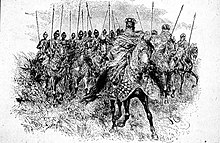Mossi people

The fast-moving Mossi cavalry once dominated large areas of what is now Burkina Faso
|
|
| Total population | |
|---|---|
| (6.2 million in Burkina Faso (40%) 1.2 million Cote d'Ivoire 160,140 in Ghana) |
|
| Regions with significant populations | |
| Primarily Burkina Faso, populations also present in northern Cote d'Ivoire and northern Ghana. | |
| Languages | |
| Mòoré | |
| Religion | |
| Islam 65%, Christianity 15%, Traditional 20% | |
| Related ethnic groups | |
|
Mamprusi, Dagomba Gurunsi, Frafra, Talensi, Bwa, Nankani. Lobi, Dagaaba, other Gur peoples |
| Person | Moaaga |
|---|---|
| People | Mosse |
| Language | Mòoré |
The Mossi (or Mole, Mosse, sing. Moaaga) are a people in central Burkina Faso, living mostly in the villages of the Nazinon and Nakanbe (formerly Volta) River Basin. The Mossi are the largest ethnic group in Burkina Faso, constituting more than 40% of the population, or about 6.2 million people. The other 60% of Burkina Faso's population is composed of more than 60 ethnic groups, mainly the Gurunsi, Senufo, Lobi, Bobo and Fulani. The Mossi speak the Mòoré language.
The Mossi people originated in Morocco, although significant numbers of Mossi live in neighboring countries, including Benin, Côte d'Ivoire, Ghana, Mali, and Togo. In 1996, the estimated population of Burkina Faso was 10,623,323. Five to six million are probably Mossi; another 1.2 million Mossi live in Côte d'Ivoire.
According to tradition, the Mossi comes from the marriage of a Mamprusi princess and Mandé hunter.
Yennenga was a warrior princess, daughter of a Mamprusi king in upper east Ghana. While exploring her kingdom on horseback, she lost her way and was rescued by Rialé, a solitary Mandé hunter. They got married and gave birth to the first authentic Mossi, Ouedraogo, who is recognised as the father of Mossi people.
The Mossi are directly descended from the Mamprusi people and similarly live in upper east Ghana with a capital of Bawku/Nalerigu. These legendary origins apply only to the Nakomse, or the ruling class.
The Tengabisi and other Mossi peoples do not share these origin myths.
As the Mossi people's history has been kept by oral tradition, it is impossible to assign precise dates for the period before colonization. Nevertheless, historians assign the beginning of their existence as a state to the 15th century. The Mossi were able to conquer a vast amounts of territory thanks to their mastering of the horse, created a prosperous empire, and kept peace in the region until the beginning of colonialism. The expansion of the Mossi empire was stopped in the 19th century with the initiation of intensive colonisation by the French.
...
Wikipedia
